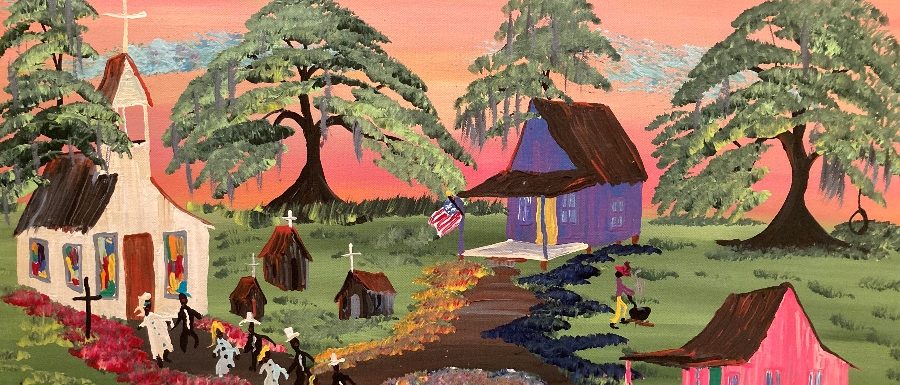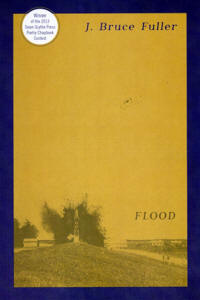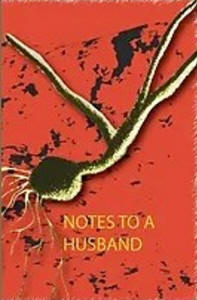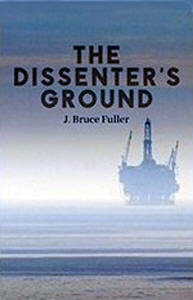
~ Delta Poetry Review ~
JJ. Bruce Fuller's Book Reviews by Susan Swartwout
A Trinity of Chapbooks by J. Bruce Fuller



Flood
(2013, winner of the Swan Scythe Press Poetry Chapbook Contest)
Notes to a Husband
(2013, Imaginary Friend Press)
The Dissenter’s Ground (2017, Hyacinth Girl Press)
I’m thrilled to recently add these three chapbooks by poet J. Bruce Fuller to my stash and to get to review them. I confess to hoarding a large chapbook collection; I love them. Chapbooks are a literary art form, each of which examines a particular topic in a compact 20–36 pages of writing. Chapbooks far too infrequently receive any written reviews, ignored by critics in favor of full-length poetry collections.
Chapbook prejudice happens in bookstores as well, where, on the mere shelf or two relegated to poetry, it is rare to find a chapbook for sale. Granted, chapbooks don’t usually have a printed spine, since the covers are folded in half over the pages. That lack causes them to virtually disappear from view when shelved. Bookstores like to pack books onto the shelves economically, spine outward, choosing only Bestsellers and Notables for the coveted face-outward placement.
But if you have the good fortune to find a chapbook, such as these by J. Bruce Fuller, you’ll have in your hands a collector’s item of exquisitely theme-focused poetry with unique, often original artwork on the cover, in a limited-edition print run. And if you’re very lucky, you’ll find one with additional, crafted details—such as a hand-sewn or ribbon-tied saddle-stitch, or a transparent overleaf, or an inset image, or specially designed endpapers, or richly textured handmade cardstock. It’s art, inside and out.
As is expected for this shorter literary format, each of Fuller’s three chapbooks adheres to a theme. Fuller has a true gift for placing the reader right into the theme’s landscape and mindset. Flood, my favorite, recalls two of Louisiana’s worst watery disasters: the epic flood of 1927, when the levee was dynamited to save New Orleans yet sacrificed poor parishes and their residents, and Hurricane Katrina, when the levees did not hold and timely national aid did not come. Having volunteered in the Ninth Ward after Katrina, I recognized the horrific scenes encapsulated in Fuller’s imagery, such as in the poem “The Dirty Side,” which illustrates what was left after Katrina stomped past: “dogs swim / from the alligators on the sidewalk . . . the boat in the yard . . . the pirogues / replace the cars in the streets.” In “Aubade:” he captures the pain of having one’s belongings spread out as “a new landfill / in the old neighborhood,” the debris of lost dreams that “is more than our trash / these were our things.”
Fuller crafts his rending poems about the 1927 flood in Louisiana storyteller voices, reminiscent of Maurice Manning’s wonderful rural Kentucky poems. The speaker of “In the Backwater” relates a family’s futile efforts with almanacs and rituals to attempt to quell the water’s slow rise over the banks and their home’s floorboards. In “Levee Patrol,” a local man describes the guerrilla war between those who want the levee blown and those who fight to protect their homes from such mayhem. The cost of either a broken levee or a diverted flood is steep. A family from the poem “In the Cypress Stand” loses their boat to the water that burst from the levee, and then their child, who could not cling to the cypress trees. The flood of 1927 section ends with “The River Is In Us,” a tour de force poem that gives us a glimpse of how intimately connected are the river and the people who live beside her.
Fuller’s chapbook Notes to a Husband is emotionally spot-on in its description of a marriage’s long death, from the objective viewpoint of the wife. Each poem is entitled “Note.” The notes that she leaves for her husband create the distance necessary for her assessment of loss and flaws on both sides. Her depiction of their marital downfall includes a matter-of-fact counting of intimacy’s lost treasures, as “no more / ring-around-the-rosies / no more nights under the pecan trees / no feet touching softly under cool / sheets” and sharp honesty in her critique of make-up sex’s total failure to save them. Her final resolution, after asking forgiveness, is as clean a break as seems possible for one heart to make: “There will be no more notes. // What’s left to say / Should not be said in anger.”
The Dissenter’s Ground is titled after the section in English graveyards, such as Bunhill Fields (first, “Bone Hill”), where nonconformists were buried, including William Blake, a main focus in these nine poems. Bunhill is as layered with meaning as these poems, having been first an ancient Saxon graveyard, then, in 1549, a place where cartloads of bones from charnel houses were piled, a home for three windmills, the dissenters’ cemetery, and finally a city park. The poems’ layers include the speaker’s soul-searching questions to Blake, poignant confessions about God and lost faith, and observations about the shifting, unpredictable land of the Mississippi Delta and, likewise, of the United States itself.
The poems, numbered rather than titled but for one, begin with the speaker’s rhetorical plea to Blake for guidance in his search for answers, then they turn to Louisiana’s coast in poem 2, where “the oil rigs / on the horizon no longer remind me of God.” The haunting poem 4, addressed to Blake, is like a wound in the center of the search, lamenting flood-forced losses and how “It shapes you, this instability.” Yet those who live on and love this land can’t do otherwise. In a chillingly predictive final line, the speaker states, “We will take drowning too far.” The speaker acknowledges his place with the dissenters of the world and, in the beautiful and wistful poem 8, entitled “Albion” (an alternative historical name for Britain as well as the poetical giant in Blake’s poetry), summarizes the steps in his futile search. That the search remains ongoing is evident in the final image: “I am Adam in the garden, palms open.” It’s remarkable that so much can be accomplished in nine poems; this is true chapbook artisanship.
The next time you have a chance to buy a chapbook, do it. You’re getting much more than you may imagine. It won’t fill your bookshelf nor drain your wallet, but it may likely enchant your mind and fill your heart.
—Susan Swartwout
| Archive | Submissions | About |